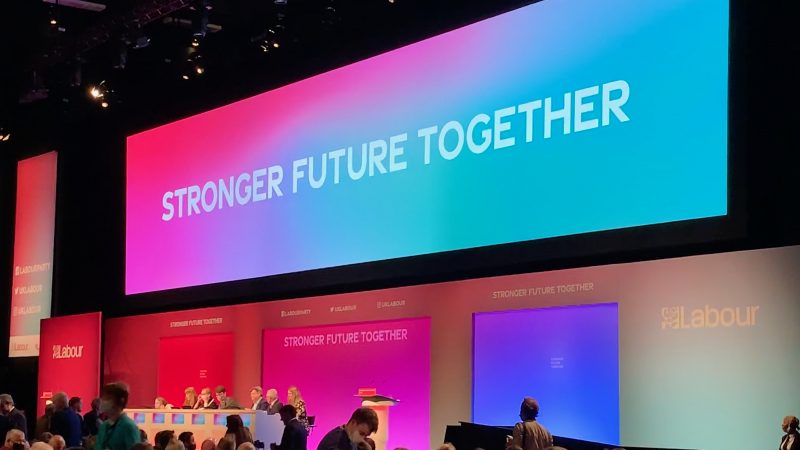
Monday morning’s conference arrangements committee (CAC) report contained the results of Sunday’s card votes. It had already been announced in the press that all of Keir Starmer’s rule changes had passed so there were no surprises there. But it was interesting to read the breakdown of the votes. A majority of Constituency Labour Party (CLP) delegates had voted against the proposal to increase the MP nomination threshold in future leadership contests. The change had won just a slim majority overall (53%-47%) and it seemed key to this result that UNISON delegates apparently voted with the leadership, against the recommendation of the union’s Labour Link committee.
I was struck by the contrast between how this issue was presented in the press and how it appeared on conference floor. The media described the vote as a major victory for the leadership. I’m not so sure. The final proposal was the third iteration considered. First, the leadership wanted to abolish one-member-one-vote and return to the electoral college. This was withdrawn. Then they wanted a nomination threshold of 25%, but this too was watered down. When the final proposal of 20% hit conference floor, it could not win a majority of CLP delegates and only squeaked through by a whisker. I don’t remember Jeremy Corbyn ever facing such opposition from delegates yet the press never covered his conference victories so sympathetically.
As always, the first item on the agenda was the CAC report. Delegates raised a number of points, for instance regarding a miscalculated vote in the general secretary election and the previous day’s biased chairing (see my diary entry from Sunday). One delegate from my CLP asked for information regarding the number of delegates who had been expelled or suspended, or who had had their credentials ripped up since the conference had begun.
We completed the rule changes on Sunday so the major votes from now on will all be on policy. It’s not entirely clear what impact these votes have. You might assume that any motions passed at our annual conference would immediately become party policy, and then be promoted by our shadow cabinet. But Shadow Chancellor, Rachel Reeves, was on BBC Breakfast this morning and when she was asked whether Labour would nationalise energy companies she said no. The answer to this should have been a straightforward “yes”: we passed a policy on Sunday committing us exactly to this. Conference delegates might wonder why we bother submitting, compositing and debating these motions if they’re to be contradicted on national television less than 24 hours after they are passed.
I mulled over this conundrum as the first major debate began, on a bundle of international motions. These were on Palestine, Afghanistan and the ‘Aukus’ security pact. Most speeches were in support of one or more of these. The sole exception was from Steve McCabe, MP for Birmingham Selly Oak and chair of Labour Friends of Israel. He argued that, had we taken the same approach to Ireland as the Palestine motion takes to Israel, there would have been no Good Friday Agreement. He condemned the policy as “hostile to the people of Israel” and characterised it as “too shouty”. His remarks were met with a muted response from delegates and all three motions passed.
The debate on the economy was largely uncontentious. As is always the case, it was interspersed with speeches from the shadow cabinet. Rachel Reeves announced a number of policies: an end to the tax exemption for private schools, the “biggest round of insourcing in a generation” and a pledge to end austerity and to “never balance the books on the backs of working people”. Finally, she promised £28bn in climate investment every year for eight years. These are all positive developments, and a far cry from Reeves’ promise in 2013 to be “tougher than the Tories” on benefits. Although the party leadership is keen to dismiss the Corbyn years as a dark stain on the party’s history, it is clear to me some welcome lessons were learned on the need for a more left-wing programme.
After lunch, we heard from Labour’s most senior elected politician: Mark Drakeford, First Minister of Wales. It was great to hear about the achievements of Labour in power. After some sniping in the press about his attendance at The World Transformed this week, I was interested to see how conference would respond to him. It was overwhelmingly positive, possibly the biggest standing ovation of the week so far. Andy Burnham was similarly well-received when he spoke alongside other metro mayors Dan Jarvis and Tracy Brabin.
The final motions debate of the day was on proportional representation. I had expected it to be quite heated. After all, LabourList has published endless articles on the topic. But when the debate came around, there were about 20 speeches and all but one were in support of electoral reform. I’m told that some of the bigger unions have a policy against proportional representation but this was not obvious from the debate. In fact, many of those speaking in favour proudly cited their union membership. It will be interesting to see how the vote falls.




More from LabourList
Josh Simons resigns as Cabinet Office minister amid investigation
‘After years of cuts, Labour’s local government settlement begins to put things right’
‘The Sherriff of Wild Westminster: what must change in elections bill’